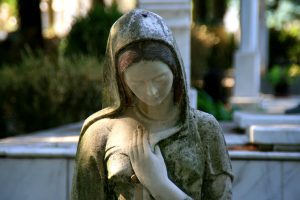December brings us all back to the gospels to reread the narratives about the birth of Jesus.
Matthew interests me because his gospel tells us about the visit of the Magi and all the troubles with King Herod. The gospel begins, however, with what some might consider the most yawn-inducing opener of any book ever written: “So here’s the genealogy of Jesus …”
It’s a wonder anyone ever gets past the first 17 verses to the wonderful news of Immanuel (“God with us”). Despite the popularity of Ancestory.com, few people enjoy reading biblical genealogies. The names are unpronounceable, and who even knows who half of those people are?
Matthew’s genealogy is actually worth paying attention to, though, because it contains some hidden gems—details not common to most of the biblical lineage lists: Women!
Four women, to be exact, and not the prominent ones you might expect. No Sarah (wife of Abraham), no Rebekkah (wife of Isaac and mother of Jacob), and no Leah (mother of Judah, patriarch of the tribe of King David).
Instead, he includes these Old Testament ladies, some of whom we might not even realize were Jesus ancestors if Matthew hadn’t mentioned them:
– Tamar (v. 3), the double-widow who devised a clever way to continue the family line of her negligent father-in-law Judah. She merely dressed as a prostitute and placed herself in his line of vision. (Genesis 38)
– Rahab (v. 5), the actual prostitute, who saved herself and her family from the falling Jericho walls by protecting two Israelite spies and helping them escape. (Joshua 2)
– Ruth (v. 5), the Moabite widow of Naomi’s son, who remained notably loyal to her mother-in-law. In the process of seeking sustenance, she attracted the romantic attention of wealthy relative Boaz, who was in line to redeem the family property and carry on Elimelek’s family line. (Book of Ruth)
– Uriah’s wife (v. 6)—Matthew not letting us forget that Bathsheba was not David’s to take—whom the king sent for and slept with after spying on her bath one lonely spring evening. A part of the story you may not remember is that in David’s old age his son Adonijah usurped the throne. Since David had already designated her second son as his successor, both Bathsheba and Solomon were in danger of being eliminated as competition. She went to David with news of the intrigue, prompting him to officially clarify his royal intentions. (II Samuel 11, I Kings 1)
Why did Matthew call attention to these specific women? What do they have in common with each other, and what is their relevance to Jesus?
Three of them weren’t even Israelites (Bathsheba is the exception). There’s not much said about their great faith or any relationship with God at all—only Ruth (“your God [will be] my God”).
None of these women had a man around at salient points in their narratives. Ruth and Tamar were widowed. Bathsheba’s husband was away at war, and then she was widowed too when David had to cover his tracks. Rahab was unmarried in the Joshua narrative.
They were all definitely women of action, women who attended to the safety of their families and integrity of the family line by whatever means available to them.
Still, I think Matthew had to have a better reason for recalling these women in the minds of his readers. Let’s look at what immediately follows the genealogy:
This is how the birth of Jesus the Messiah came about: His mother Mary was pledged to be married to Joseph, but before they came together, she was found to be pregnant through the Holy Spirit. Because Joseph her husband was faithful to the law, and yet did not want to expose her to public disgrace, he had in mind to divorce her quietly. (v. 18-19)
Matthew next describes the angel’s visit to Joseph, telling him to chill because this was a God thing. He never bothers, though, to mention Gabriel’s visit to Mary and her obedient submission. He just jumps right to the scandal. You can bet that most of the people who had NOT received angelic confirmation were unconvinced of the Immaculate Conception story. Mary likely bore some stigma about this premarital pregnancy for years afterward.
I think this might be the connection with the women in the genealogy. I mean, they all had episodes of questionable impropriety in their stories:
– Tamar got pregnant by her father-in-law.
– Rahab was a prostitute.
– Bathsheba, whether by choice or not, ended up pregnant with the king’s baby.
– Even Ruth did that weird thing of sleeping at the feet of Boaz on the threshing floor after he had been drinking. (Boaz was definitely flattered but also seemed concerned that her presence there may have been misinterpreted by others and her reputation tarnished.)
These are not the kind of women we expect to be highlighted here. Matthew is essentially making sure we all know that the mother of the Christ Child shared their DNA. And, yes, Mary may too have come out of this whole thing with a sullied reputation as a result of God’s redeeming work in the world.
God, implies Matthew, was never much hung up on a woman’s reputation anyway (or her nationality or even her religion). He just worked through women who would advance his purposes. Playing a supporting role in God’s story doesn’t necessarily require extraordinary faith or years of life experience either. He uses who he wants to use, and he never limits himself to the people who look like they deserve the part.
That’s some pretty good news for those of us who can’t even pretend to be flawless good girls or spiritual giants.
The stories like this continue throughout the gospels, too. Jesus got this message from the ladies in his lineage, so throughout his ministry he chose women who were viewed by religious culture as flawed or scarred to exemplify some valuable kingdom lessons. Stay tuned for more in my next post!


Leave a Reply
You must be logged in to post a comment.